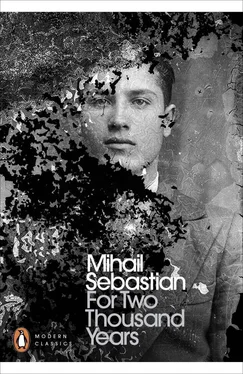‘I don’t know, I can’t remember. Maybe I was bored, or upset. I don’t recall. But, to tell you the truth, I’m not sorry. I’ve never liked being too amiable with people, even with those I’m fond of. Particularly not with them. I tell myself, out of a hundred times you prod a person, perhaps twice you’ll get their attention usefully. When I walk through the grass, I don’t watch out for the blades of grass or beetles getting walked on. The earth doesn’t care for such delicate attentions. Stamp on and flatten all you want — after you’ve passed by the roots will continue growing, if they’re roots. When you walk on the soil, walk on the soil. When you walk among people, walk among people. A little blindly. It doesn’t matter. You’ll knock over a few things — the weak ones. But you’ll stimulate the others. Leaping before you look is an essential exercise. I haven’t spared myself and I’m not going to spare anyone else, particularly not if I’m fond of them.’
It’s a tonic. Grit your teeth and carry on.
I realize, leafing through this notebook (it never occurred to me before to re-read it until yesterday, when, looking for Les Liaisons dangereuses to give to Marga, I came across it and opened it with a certain curiosity, as though it were an unfamiliar book) — that I’ve written nothing about her, about Marga Stern, for so long. This is rather strange because, of all the things that have happened to me recently, there is nothing I value more than having come to know her. (I don’t know why I avoid saying ‘love’, which would be simpler and more exact, a hesitation which she herself has observed on a number of occasions, without reproaching me, but with a tinge of bitterness.)
I don’t regard this omission as pure chance. With a little effort at recollection, I’ve discovered, re-reading my notebook, something even more curious. What I note is that most of the long gaps in the diary coincide with intense (‘intense’ is putting it too strongly) moments in our love. Whenever a break of several weeks occurs in my notes, I search for and find beneath the silence something concerning Marga.
I’m a ‘difficult love’ — according to her — and, fortunately, she manages to accept this difficulty.
I ask Marga to come, I ask her to leave, I call her several days in a row in order to avoid her for weeks later on. The game would be outrageous were there not between us a tacit pact of freedom and forgiveness. I’m grateful she can respect the rules of the game so lucidly. Then, there is a certain weariness in her, which prevents emotionalism. And something else. A slight smile of discouragement, which must be her revenge on me.
But here I am psychologizing — that’s not what I intended.
*
The strange fact remains that, without exception, every good moment of our love has been marked here, in my diary, by a blank page.
There are days I love that girl with simplicity and an open heart and I feel how she makes me happy. I await her calmly and unhurriedly — a little indifferently perhaps, with the right amount of indifference this calm love requires — and when she comes, when I feel her nearby, leaning back against the terracotta stove, or tucked into the right corner of the divan, or leaning attentively over my shoulder, over the table I work at, all these details are all such great, natural joys.
Clearly Marga and my diary don’t get along. There are far too many general ideas, too many ‘problems’ here.
I note I’ve picked up the detestable habit of stating categorical truths. Too often I use that plural formulation (‘we’ are this, ‘we’ are that, ‘our’ destiny, ‘our’ duty) and generalize a collective, confused experience in this ‘we’ that at other times I wouldn’t allow myself to use without verifying it in the light of personal experience.
Marga, who takes pride in having no aptitude for abstractions, is for me — to use a pedantic term — ‘reasserting her individuality’. (If she could read this, she’d be horrified. Forgiving as she is, I wouldn’t be forgiven this.) I don’t know, perhaps our love has its concrete, immediate ‘problems’, which simply derive from the meeting of our two individual selves. Nothing destroys general ideas and conclusions more radically than being in love, since love reduces everything down to your own sensibility, reinventing superstitions, certainties, and doubts and values, obliging you to live them, to test them, to re-create them. There is something profoundly original in every love, a principle of birth, of creating all things from the beginning.
No, I don’t love Marga passionately, I’m well aware of that, as is she, but all it takes is for her to happen along for the ‘big questions’ to disappear and be replaced by the whole world of living, personal meanings. Small change, of course, yet so vital.
What I particularly love in her is her terrible fear of abstraction. If I happen inadvertently to mention one of my famous intellectual crises, this girl, usually so understanding, suddenly withdraws, discreetly but firmly, refusing not only to answer, but even to comprehend. She has a particular inclination for things, objects, particular facts and individual people.
Me, you, this book, this chair, that window. She alone in all my world — family, friends, acquaintances — did not consider my move from law to architecture an extravagance. When I told her, she responded, almost without surprise, ‘Good for you.’ Her awareness and interest in my new duties surprised me at first. She asks me to explain things exactly, wants details, looks and inquires. Once she made me take her to the workshop and she stayed there all afternoon, wandering freely between the tables, mingling with my classmates. Usually so uncommunicative, she asked questions, demanded technical details, picked up the modelling clay familiarly and tried to work it. If I’m busy at my drawing board when she calls to visit, she won’t let me interrupt the work; she pulls up a chair, kneels on it, elbows on table, and watches with a seriousness that seems to me utterly childish. A true vocation.
There is certainly something lucid in her intelligence — and perhaps limited at the same time — something practical, and with a sense of proportion. I understand now why I was amazed by her reputation as a good pianist when I heard her playing for the first time, some time ago. Technically accomplished perhaps — I’ve no idea — but her musical style is odd, to say the least. Unfortunately, she was playing Chopin then, a nocturne, which she made unrecognizably straightforward, precise, well defined. Marga doesn’t play, she follows the rules. Just by listening to her, I managed to understand for the first time what was meant by the ‘construction of a piece of music’. I saw it drawn up, logically, phrase by phrase, movement by movement. (Maybe this is where her curiosity about architecture comes from.) This style probably involves numerous musical risks, and has certain advantages. It’s a great pleasure to hear her playing Mozart; it’s a tight, painstaking Mozart, like the cutting of an incredibly fine surgical saw.
*
How is Marga Stern able to relate naturally and calmly to things, and what is the source of her happy ability to shield herself from dreams and illusions? I envy her for her happy, sane and easy-going practical spirit. I’m envious of her lack of imagination and her resistance to abstraction. I have the same kind of admiration for this sensible spirit as I would for a healthy body, secure in its strength and physical integrity.
Can it be that there is nothing Jewish in this beloved girl, not a single feature, not a shade, not a single turning inwards towards the broken layers of memory deposited there?
Читать дальше












